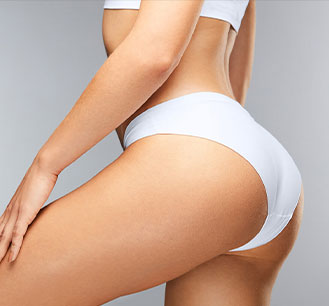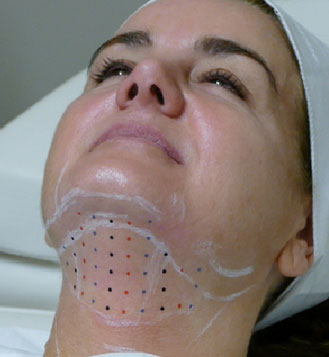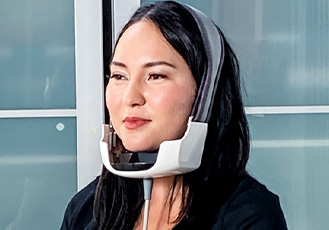
Few accomplishments are as rewarding as waking up in the morning and hitting your target weight. You've worked hard to drop those unwanted pounds all year long, and you deserve a huge round of applause for what you've accomplished. However, if you're like many men and women, getting the sleek, sculpted body you crave is easier said than done. You've got pockets of unwanted fat around your abdomen, thighs, chin, and other areas - fat that just won't go away, despite diet and exercise.
Wouldn't it be nice to just freeze that fat away and forget all about your love handles?
At Southern Cosmetic Laser, our new, revolutionary fat-freezing treatment can help you achieve the toned look you've been dreaming of. That's right - we're talking about literally freezing the unwanted fat off your problem areas without invasive surgeries or extended downtime.
This amazing treatment is called CoolSculpting, and it's the world's leading non-invasive fat reduction procedure. It's specifically designed for people already at their desired weight who want to push past that plateau for real body sculpting results. If you're tired of seeing that excess belly fat, saggy skin, or double chin, CoolSculpting is the procedure for you. Southern Cosmetic Laser offers a wide range of the newest technologies to target fat reduction, skin tightening, facial and body remodeling, body toning, and cellulite reduction.

Our Services
Services Area

What is CoolSculpting?

CoolSculpting is an FDA-approved procedure that has undeniable results. With CoolSculpting, you can permanently get rid of your muffin top, fat around your flanks, and more, all from the comfort and convenience of the Southern Cosmetic Laser office.
Technically known as cryolipolysis, CoolSculpting has the ability to reduce the number of fat cells in targeted areas between 20 and 25%. This unique technology uses controlled cooling to freeze and eliminate fat with minimal recovery time. No needles, no scalpels, no liposuction. Just real results provided by a licensed, experienced professional.
While CoolSculpting helps eliminate fat cells in your body, it doesn't harm the surrounding skin and muscles. Instead, it treats fat that is directly under the skin, also called subcutaneous fat. Since CoolSculpting doesn't target visceral fat deposits, this treatment works best for men and women who are approaching or already at their desired weight.
CoolSculpting is approved by the FDA to help reduce fat in the following areas:
- Flanks
- Outer Thighs
- Upper Arms
- Inner Thighs
- Chin
- Back
- Belly and Abdomen
How Does CoolSculpting Work?

CoolSculpting results are noticeable, proven, and long-lasting, helping you look your best and feel great from every angle. This exciting procedure works because fat cells freeze at higher temps than other tissues. As such, CoolSculpting delivers controlled, targeted cooling to do away with unwanted fat underneath your skin. These fat cells are essentially frozen or crystallized and eventually die. With time, your body will process that fat and will eliminate the dead cells, leaving behind a more sculpted physique.
Here are some quick CoolSculpting facts at a glance, so you have a better idea of why this fat cell elimination treatment is so popular:
- There is no prep time required for CoolSculpting from Southern Cosmetic Laser.
- Patients can expect some very minor discomfort during the procedure. Many patients report no discomfort at all.
- There is little-to-no downtime needed after your CoolSculpting procedure is complete.
- It may take up to 12-16 weeks to see your final results.
- This procedure eliminates fat permanently!

Southern Cosmetic Laser's CoolSculpting Procedure

Our CoolSculpting procedure is crafted around your comfort, with one-on-one attention in a relaxing atmosphere. It all starts with a detailed assessment, which you will complete prior to your treatment. This assessment will help us better understand your goals and desires, so we can freeze away the stubborn fat from the areas that matter most.
Typical CoolSculpting appointments take about an hour per area, though that time varies with each patient. Because our CoolSculpting applicators use a vacuum system to help with placement, you may feel a pulling sensation in the targeted area. Once placement is complete, we get to work on freezing your fat.
Before treatment, your skin is prepped with an alcohol wipe. A gel pad is then placed on your treatment area to help protect your skin. From there, a cold sensation is delivered through our applicators, which are designed for specific body parts.
Because there is no sedation involved with CoolSculpting, we encourage you to kick back, relax, and watch a little TV. If you prefer, you can also read or use your phone to check your favorite social media sites. Our friendly, experienced CoolSculpting technicians strive to keep you as comfy as possible during this quick treatment. When it's over, you can resume normal activities as soon as you like - there's no recovery or downtime to worry about!


Top CoolSculpting Treatment Areas

CoolSculpting procedures are perhaps best known for eliminating stubborn belly fat, giving the patient a desirable, contoured tummy. However, this treatment is also very effective on other areas of your body:
CoolSculpting for Your Double Chin
While neck fat usually goes hand-in-hand with weight gain, symptoms like double chins can appear even if you're not overweight. CoolSculpting helps solve neck fat problems by eliminating fat cells in the area below your chin, giving you a slim, youthful appearance.

CoolSculpting for Unwanted Belly Fat
Many men and women begin CoolSculpting treatments to destroy fat around the abdomen or midsection. CoolSculpting does so by freezing stubborn subcutaneous fat in the abdominal region, resulting in a trimmed-up tummy. Remember, CoolSculpting does not treat visceral fat, or the fatty tissue surrounding the organs in your abdomen.

CoolSculpting for Your Back
Back fat is a serious problem for many people in the U.S. This includes the upper back (where fat rolls over the bra), the mid-back (near the waist), and the lower back (where fat bulges over the beltline). Back fat can be hard to tone, but with CoolSculpting from Southern Cosmetic Laser in Charleston, it's more than possible.

CoolSculpting for Your Upper Arms
When it comes to stubborn fat, your upper arms are often the most difficult areas to treat. If you are constantly trying to hide your upper arms from friends and family, CoolSculpting is an excellent option to help overcome your insecurity.

CoolSculpting for Your Love Handles
Sometimes called saddlebags or flanks, love handles are the flabby areas that protrude from your hips. Love handles are often caused by fat retention over long periods of time. They can appear very pronounced in tight clothing, leading to feelings of embarrassment. Common factors that contribute to love handles are age, slow metabolism, hormones, and diets high in sugars and fats. With Southern Cosmetic Laser's CoolSculpting, patients leave behind stubborn love handles, helping them achieve a slimmer, more fit appearance.

CoolSculpting for Your Thighs
If you are in good shape but suffer from chafing or discomfort due to fatty thighs, your solution could be at Southern Cosmetic Laser. Our technicians can help freeze away inner thigh fat, so you feel proud to wear skirts, shorts, and bikinis.


Questions About CoolSculpting? We've Got Answers
Q: Does CoolSculpting really work?
A: Yes! Southern Cosmetic Laser wouldn't be one of the most trusted providers of the treatment if it didn't work. According to recent statistics, CoolSculpting treatments can reduce fat reduction by as much as 25% in the affected area. Contact our office today for your initial consultation, where our team will advise you on how many treatments you need to meet your goals.
Q: How much does CoolSculpting cost?
A: Pricing varies depending on the areas you focus on and how many sessions you need in order to reach your goals. Our team will craft a custom treatment plan specific to you during your initial CoolSculpting consultation.
Q: How quickly will I see results?
A: Many patients can see results as soon as three weeks after their first CoolSculpting procedure in Charleston. As your body continues to dispose of crystallized fat cells, you can see even more changes with time.
Q: Does CoolSculpting eliminate cellulite?
A: CoolSculpting is designed for fat reduction. However, it may help contribute to cellulite reduction in specific treatment areas. There are currently no FDA clearances for cellulite reduction with CoolSculpting. However, our office offers incredible treatments like Inmode Evolve to reduce the appearance of cellulite and trim, tighten, and tone your skin.
Q: Why should I choose Southern Cosmetic Laser for CoolSculpting in Charleston?
A: Southern Cosmetic Laser is a CoolSculpting certified practice and has completed advanced training at the CoolSculpting University. With a highly-trained staff of medical professionals, we're one of the leading providers of CoolSculpting in South Carolina. We know that peace of mind is precious these days. That's why we're committed to you and your body contouring transformation every step of the way.
Popular Treatments That Complement CoolSculpting

We are a full-service practice offering Medical Aesthetics and Cosmetic Dermatology services. As such, Southern Cosmetic Laser has several innovative treatments that complement your CoolSculpting procedure. Whether you're looking to tighten up that turkey neck or say goodbye to cellulite, we've got a custom treatment option waiting for you.


Cellulite Treatment with Sentient Sculpt
Southern Cosmetic Laser is Charleston's first medical aesthetics practice to offer Sentient Sculpt. This exciting new product reduces fat, remodels skin tissue, and regenerates skin collagen, leaving your skin tight and smooth.
Using microwave technology, Sentient Sculpt uses up to 80% of the energy generated to penetrate fat under your skin. This process destroys fat cells and the fibrous bands that cause dimples, or cellulite. The remaining 20% of energy is used on the upper layers of your skin, tightening and contracting it to improve its overall appearance.
Sentient Sculpt benefits include:
- Long-Lasting Results
- Improved Skin Laxity
- Effective Skin Tightening & Fat Reduction
- Fat Cells Permanently Destroyed
- Younger Looking Skin
- Minimal Discomfort
- Built-In Cooling for Maximum Comfort
Contact Southern Cosmetic Laser today to learn more about the benefits of Sentient Sculpt and how it can be paired with CoolSculpting treatments.

Kybella for Your Double Chin
If you're ready to kiss that double chin goodbye, Kybella could be the solution you need. Kybella is a treatment that deoxycholic acid that breaks down fat cells when injected into the treatment area. It provides noticeable results for improved chin profile.
Kybella Benefits Include:
- Permanent destruction of fat cells
- Quick treatment process
- Patients may see results in 2 to 4 treatments

Facial Remodeling with Inmode Evoke
Inmode Evoke is the first and only FDA-approved, non-invasive product for facial remodeling treatment. Evoke offers tightening and lifting for facial rejuvenation and can help you achieve a more defined neck and jawline.
The Evoke Intelligence System regulates temperature and sense impedance every millisecond, providing remarkable results. Using proven bipolar radiofrequency energy, Evoke sub-dermally remodels your facial tissue. The Evoke technology offers precise, consistent power to achieve optimal results.

Tite, Trim, & Tone with Inmode Evolve
This advanced, state-of-the-art Thermal Body Contouring Technology helps to trim, tighten, & tone your skin at the same time. Evolve's cutting-edge tech can destroy fat, reduce cellulite, and tighten skin. The result? A newfound, youthful appearance and feel. This treatment is perfect for your mommy makeover, eliminating muffin tops, sculpting abs, and addressing fat around your thighs, belly, arms, legs, hips, and knees.
Benefits of Inmode Evolve include:
- Tone and Tighten Skin
- Eliminate Fat Cells
- Reduce Crepey Skin
- Reduce Saggy Skin
- Collagen Stimulation for Improved Skin Elasticity
- Smooth Over Stubborn Fat Pockets
- Even Out and Reduce Skin Irregularities
Contact Southern Cosmetic Laser today to learn more about the benefits of Inmode Evolve and how it can be paired with CoolSculpting treatments.

Discover CoolSculpting Precision and Unlimited Beauty with Southern Cosmetic Laser
When it comes to unmatched patient care and body contouring services in Charleston, no other practice comes close to Southern Cosmetic Laser. We pour passion into every service we offer, from non-surgical fat cell freezing to laser hair removal. If you're looking to make a change for the better this year, we're here to make your wishes a reality. Contact our office today to learn more about the stunning benefits of CoolSculpting technology. Before you know it, you'll be excited to show off that new bathing suit or bikini on the beach.
 843-277-2240
843-277-2240
Free Consultation
Latest News in Charleston, SC
Editorial: The best answer to Charleston's worsening congestion isn't more roads — or bridges
THE EDITORIAL STAFFhttps://www.postandcourier.com/opinion/editorials/ravenel-bridge-charleston-sc-transit/article_6f1f8dcc-0198-11ef-b2e0-07d0c451b891.html
Well, that didn't take long. Less than 20 years after South Carolina's largest, widest and most costly bridge was built over the Cooper River, some are asking whether it's large and strong enough to handle its increasing traffic flow.As The Post and Courier's Eva Herscowitz noted in a recent article, "Can the Ravenel bridge handle more traffic?" the num...
Well, that didn't take long. Less than 20 years after South Carolina's largest, widest and most costly bridge was built over the Cooper River, some are asking whether it's large and strong enough to handle its increasing traffic flow.
As The Post and Courier's Eva Herscowitz noted in a recent article, "Can the Ravenel bridge handle more traffic?" the number of cars and trucks crossing the Arthur Ravenel Jr. Bridge has swollen from about 75,500 a day when it opened in 2006 to about 94,400 a day in 2022, the most recent year for which the state has data. And while these growing numbers pose no immediate structural threat to the cable-stayed bridge that defines the Lowcountry skyline, it's increasingly common for traffic to slow to a crawl during peak morning and evening hours — or whenever there's a significant accident.
It's yet another sign that leaders across the Charleston region need to plan for better ways for our growing population to get around town. Specifically, it's time to begin planning for bus rapid transit that would run east-west across the metro region.
The north-south line has been in the works for years: The Lowcountry Rapid Transit line will run 21.3 miles between downtown Charleston and the Ladson fairgrounds, and unlike our region's existing bus service, these new buses will travel at least part of the time in dedicated lanes, avoid significant delays by requiring passengers to pay in advance and even be able to change traffic lights. All those features promise to make the transit line run faster than regular traffic, increasing its appeal and ridership.
Unfortunately, it takes years to develop a new bus rapid transit line because with federal funding (the Federal Transit Administration is paying 60% of the cost) comes federal red tape. The Charleston Area Regional Transportation Authority has been working on the rapid transit line since 2016, when Charleston County voters approved money for it as part of a sales tax extension. Since then, the cost projection has almost doubled, from $360 million to $625 million, and the start of construction is still about two years away. If all goes well, the line is expected to start running by 2029.
That's why CARTA officials and local mayors and councils should start discussing the next line, which would serve West Ashley and Mount Pleasant, as well as a potential northern spur along U.S. Highway 52 toward Goose Creek and beyond.
After all, financing and constructing another bridge alongside the Ravenel Bridge would be far more expensive and might not even be doable, given the intense level of new development near where the span touches down on both sides. In fact, the difficulty of building another bridge or widening the existing one is another example of how hard it has become to build our way out of congestion problems. And then there are the neighboring residents who understandably object to the idea of living near wider, faster, noisier highways, or having their homes taken to accommodate road construction.
Building a better, more expansive bus rapid transit network would take some time and significant political cooperation, as this service would have to span many council districts, municipalities, even counties to work as it should. For just a small fraction of the more than $2 billion some Charleston County Council members hope to spend on a highly controversial highway extension, we could pivot and make a significant down payment on a new way to get around. A more robust public transportation network wouldn't serve as a magic wand that makes our traffic problems vanish, but it would help us make more efficient use of the roads we have and slow the pace at which congestion worsens, all while preserving and protecting our special sense of place.
Will the Charleston region's new set of leaders work together on a new vision or pursue more of the same?
Parking space crisis, rethink Columbus Street Terminal use, Ride the Lowcountry | Letters
From Our Post and Courier Readershttps://www.postandcourier.com/opinion/letters_to_editor/opinion-letters-parking-space-crisis-columbus-street-terminal/article_cc19eb98-f285-11ee-9866-e73da747c8ef.html
I write in response to the April 19 editorial and my own experiences concerning downtown Charleston parking garages.I used to love parking at the Wentworth Street garage. I live downtown and could always find a parking space. I could be shopping on King Street within 10 minutes. But not now.I recently drove along Beaufain Street to th...
I write in response to the April 19 editorial and my own experiences concerning downtown Charleston parking garages.
I used to love parking at the Wentworth Street garage. I live downtown and could always find a parking space. I could be shopping on King Street within 10 minutes. But not now.
I recently drove along Beaufain Street to the garage behind Target since the Wentworth garage was closed.
It had a sign indicating the lot was full, and a man waved me off.
There was no available parking on the streets, especially since it was the beginning of high tourist season, so I had to return home.
I had planned to shop on King Street. This has likely happened to others, and I believe that merchants must be losing business.
On my birthday, my daughter planned to take me to lunch at 82 Queen. We planned to park across the street in the garage.
But you guessed it. The garage was full.
We didn’t know what to do, so finally we had to park several blocks away at my church and walk. This was very stressful as it was supposed to be a special day.
In addition to the millions of annual visitors to Charleston, many people are moving here every day.
The editorial was right when it called the closing of the Wentworth garage a major livability issue. I believe we are near a crisis point with this situation.
I contacted Charleston Mayor William Cogswell’s office but had not heard back as of Thursday afternoon.
If anyone else feels this is a problem in our beloved Charleston, I urge you to call the mayor as well. And I have a request: Could the city make the Wentworth garage taller so more cars could park there?
ANGELA MCLESTER
Charleston
A recent commentary from State Ports Authority CEO Barbara Melvin and SPA Board Chairman Bill Stern rebutted the idea of eventually selling the Columbus Street Terminal and moving port operations up the Cooper River by extolling the virtues of the property’s current use.
What they failed to acknowledge were all of the current and future drawbacks to the continued use of this land for port activity.
While having a port here made sense many years ago, the city has grown around the port.
Now, anyone driving down East Bay Street or coming from the pedestrian path on the Ravenel Bridge is treated to a massive concrete parking lot and chain-link fence that impedes harbor access and provides a view of giant cranes and thousands of parked cars.
With the ever-growing threat of sea level rise potentially inundating the newly produced BMWs sitting in this giant parking lot, isn’t it time for port leadership to at least start planning for the eventual relocation and opening up the property to a much better use for the benefit of the city and its citizens?
The expansion of port property on the Cooper River and the replacement of the Don Holt Bridge should help facilitate this move.
BURT HODGES
Mount Pleasant
Coastal Cyclists, a local bicycle club in the Charleston area, hosted the annual Ride the Lowcountry this month to raise money in support of cycling advocacy, primarily Palmetto Cycling Coalition and Charleston Moves.
This year, about 600 cyclists participated.
To avoid crashes and possible injuries, we requested that the S.C. Department of Transportation fill potholes and cracks in the roads that we travel, many of which might not be noticed by a car but could easily cause a cyclist to fall.
Abbi Rajabi and his DOT staff responded to our request. We would like to acknowledge the work done on the many miles of roads prior to our event that resulted in a ride with no injuries from road conditions.
We appreciate this cooperative and effective relationship that has helped us have a safe and successful event.
BOB MARKISELLO
Past Coastal Cyclists president and director
Ride the Lowcountry
Mount Pleasant
What’s on your mind? Join our community conversations and let your voice be heard by writing a letter to the editor. Letters can be a maximum of 250 words and are subject to editing for clarity, tone and libel. They must include the writer’s name and city for publication and a daytime telephone number for verification. Email your submissions to letters@postandcourier.com or fill out the form on our online portal.
Get a weekly recap of South Carolina opinion and analysis from The Post and Courier in your inbox on Monday evenings.
The Gaillard Center Presents: Idina Menzel – Take Me or Leave Me
Charleston Businesshttps://charlestonbusiness.com/communitycalendar/the-gaillard-center-presents-idina-menzel-take-me-or-leave-me/
DetailsThe tour will feature fan favorites from throughout Idina Menzel’s illustrious career, showcasing iconic hits from Wicked, Rent, and newer music from her electrifying dance album, Drama Queen, which was released this past Summer.Menzel recently finished a month-long run of her new musical production, Redwood, at the La Jolla Playhouse in California. The production released a live track of the production called “Great Escape” as the world’s first listen to the music from the show, which features ...
Details
The tour will feature fan favorites from throughout Idina Menzel’s illustrious career, showcasing iconic hits from Wicked, Rent, and newer music from her electrifying dance album, Drama Queen, which was released this past Summer.
Menzel recently finished a month-long run of her new musical production, Redwood, at the La Jolla Playhouse in California. The production released a live track of the production called “Great Escape” as the world’s first listen to the music from the show, which features new original musical co-conceived by Idina and Tina Landau, with music by Kate Diaz and lyrics by Diaz and Landau, and book and direction by Landau.
Menzel is a Tony-Award winning, powerhouse multi-hyphenate: a singer, an actress in film and TV, a songwriter, a Broadway star, and a philanthropist. She rose to fame for her role as Maureen in the popular Broadway musical Rent, and her career took off when she won a Tony Award for her role as Elphaba, the Wicked Witch of the West, in the smash musical Wicked.
Her voice can be heard as Elsa in Disney’s Oscar® winning Frozen, the second highest grossing animated films of all time, with more than $1.2 billion in worldwide box office revenue. The film’s song “Let It Go”, voiced by Menzel, became an instant international phenomenon, winning the Oscar® for Best Original Song–where Menzel performed it at the ceremony–and the Grammy® Award for Best Song Written for Visual Media. The track reached #5 on the Billboard Hot 100, making Menzel the first artist with both a Billboard Top 10 hit and a Tony Award for acting. Menzel received the Breakthrough Artist of the Year Award at Billboard’s annual Women in Music event in 2014 and performed the National Anthem at Super Bowl XLIX.
A skillful songwriter, Menzel’s prolific recording career includes multiple cast albums and the solo albums: Still I Can’t Be Still, Here, I Stand and idina, which landed in the Top 30 on Billboard’s Top 200 charts upon its release in 2016. She’s released 2 holiday-themed albums, Holiday Wishes, which debuted at #1 on Billboard’s Holiday Albums chart and gave Menzel a Top 10 album on the Billboard Top 200 Album Chart and its 2019 follow-up, Christmas: A Season of Love featuring duets with Ariana Grande, Billy Porter, Josh Gad and Idina’s husband, Aaron Lohr.
This past fall, Menzel released her electrifying dance project Drama Queen via BMG. The project is a departure from what she’s released in the past, as Menzel showcases her powerhouse vocals through disco-infused beats and soaring anthems. Idina worked with award-winning collaborators including Nile Rodgers (Chic, Diana Ross, Beyonce), Justin Tranter (Lady Gaga, Selena Gomez), Jake Shears (Scissor Sisters), Sir Nolan (Shawn Mendes, Carly Rae Jepsen), Jim Eliot (Elie Goulding, Kylie Minogue) and more.
Menzel has also released two children’s picture books alongside her sister, Cara Mentzel, called “Loud Mouse,” and “Proud Mouse” via Disney Publishing Worldwide. Both books center around self-acceptance and being true to yourself.
Lost lineage comes to life with new resource at Intl. African American Museum
Shelbey Robertshttps://www.live5news.com/2024/04/25/lost-lineage-comes-life-with-new-resource-intl-african-american-museum/
CHARLESTON, S.C. (WCSC) - A new resource at the International African American Museum is helping some families trace their family lines more easily.Lost lineage is coming to life at the Center for Family History at the International African American Museum.Brian Sheffey is the director for the museum’s Center for Family History. He’s one of the four staff members working to help families discover their lost lineage, especially for Black Americans.“It is an important journey and I think it’s really...
CHARLESTON, S.C. (WCSC) - A new resource at the International African American Museum is helping some families trace their family lines more easily.
Lost lineage is coming to life at the Center for Family History at the International African American Museum.
Brian Sheffey is the director for the museum’s Center for Family History. He’s one of the four staff members working to help families discover their lost lineage, especially for Black Americans.
“It is an important journey and I think it’s really important in terms of developing our sense of self and our sense of identity. And for African-Americans specifically, understanding just how long our bloodlines have actually been in this country,” Sheffey said.
For many Black Americans, the quest to uncover ancestry is layered; centuries of slavery separated generations of families. So re-establishing roots can be difficult, but not impossible, Sheffey said.
“There is this very stubborn myth and it even gets repeated by some Black genealogists and researchers that we can’t research our people beyond 1870 and that’s so untrue,” he said.
Recently, the center launched its new Genealogy Research Area and Reference Library. There, visitors will find kiosks and iPad stations loaded with subscriptions to genealogy and historical websites.
“Vital records, things like birth records, marriage records, Christening records, baptism records and we also go over when these records first started because every county is a little bit different. Every state was different,” Sheffey said.
The library houses more than 1,000 books all focused on how to start the process of finding family members. The resources help create, collect and showcase Black experiences.
“The Center for Family History is all about those individual stories. All the stories that you see, all the stories that people find while they’re here, those are the little individual pebbles that feed all the way into the main gallery,” he said.
Sheffey hopes those who visit the Center for Family History will feel empowered in their identities.
“My voice should count as much as anyone else’s talking about what is an American, what isn’t American and who should be included — the narratives about the founding of this country,” Sheffey said.
Copyright 2024 WCSC. All rights reserved.
South Carolina Public Radio and College of Charleston announce “Teachable Moments”
Landon Mastershttps://www.scetv.org/stories/2024/south-carolina-public-radio-and-college-charleston-announce-teachable-moments
New radio segment Teachable Moments with College of Charleston’s Dr. Rénard Harris offers insights for students and parentsSouth Carolina Public Radio (SC Public Radio) and the College of Charleston are proud to announce a partnership aimed at delivering concise, impactful insights tailored for both students and parents. The one-minute radio segment, Teachable Moments...
New radio segment Teachable Moments with College of Charleston’s Dr. Rénard Harris offers insights for students and parents
South Carolina Public Radio (SC Public Radio) and the College of Charleston are proud to announce a partnership aimed at delivering concise, impactful insights tailored for both students and parents. The one-minute radio segment, Teachable Moments, is designed as a platform to address pressing educational issues dedicated to offering valuable perspectives to listeners.
From the prevalence of cellphones in classrooms to the intricacies of homework management, mental health awareness and combating childhood obesity, each episode of Teachable Moments shares a concise yet comprehensive exploration of pertinent issues. Listeners can expect an array of discussions, from practical tips for fostering academic success to insights on promoting holistic well-being. Through Teachable Moments, host Dr. Rénard Harris aims to bridge the gap between educators, parents and students, fostering a collaborative environment conducive to learning and growth.
Dr. Harris is an Associate Professor of Management in the School of Business at the College of Charleston. He holds an Ed.D in teacher education. Since his time at the College of Charleston and several years prior, he has explored multicultural education, diversity, equity and inclusion, storytelling, cultural relevance and leadership. He is often called upon to serve as a keynote speaker, inclusion facilitator and consultant for businesses and educational institutions.
The collaboration between SC Public Radio and the College of Charleston underscores the shared vision of fostering community engagement and advancing educational initiatives.
Tune in to Teachable Moments on SC Public Radio every Friday during Morning Edition and All Things Considered.
QUOTES
“SC Public Radio is excited to unveil this collaboration with the College of Charleston. Teachable Moments represents a step forward in our efforts to elevate educational discourse and empower our community with valuable insights. Through engaging discussions and thought-provoking content, we aim to ignite a passion for learning and foster meaningful connections between educators, parents and students.” –SCETV President and CEO Adrienne Fairwell
“The College of Charleston is excited to work with SCETV, a fellow state agency that provides a great service to the people of South Carolina. This new partnership provides a wonderful opportunity for our university to share timely and helpful content to SCETV listeners and puts a spotlight on what we, as an institution, do best: teach.” –College of Charleston President Dr. Andrew Hsu
“I love being the host of Teachable Moments. The engaging topics give the listeners something to think about, tilt their head about, and smile about. Ultimately, we get to add some good to folks’ days.” –Teachable Moments Host and College of Charleston Professor Dr. Rénard Harris
“Teachable Moments aims to deliver impactful insights and spark meaningful conversations about pressing educational topics. Through this partnership, we are dedicated to providing our listeners with a platform where they can gain valuable perspectives, practical tips and evidence-based solutions to navigate the challenges of modern education.” –Director of SC Public Radio Sean Birch
About South Carolina ETV and Public RadioSouth Carolina ETV and Public Radio (SCETV) is the state's public educational broadcasting network. SCETV amplifies South Carolina voices, provides educational experiences and strengthens communities, while working toward creating a stronger, more connected and informed South Carolina. In addition to airing local programs, such as Carolina Classrooms, Making It Grow, and This Week in South Carolina, SCETV also presents multiple programs to regional and national audiences, including By The River, After Action, Reconnecting Roots, Reel South, Somewhere South, Yoga in Practice, Downing of a Flag and How She Rolls. In addition, SC Public Radio produces the national radio production, Chamber Music from Spoleto Festival USA.
About the College of CharlestonLocated in the heart of historic Charleston, South Carolina, the College of Charleston is a nationally recognized, public liberal arts and sciences university. Founded in 1770, the College is among the nation’s top universities for quality education, student life and affordability. Its beautiful and historic campus, combined with contemporary facilities, cutting-edge programs and accessible faculty, attracts students from across the U.S. and around the world.
Media Contacts:Landon Mastersmedia@scetv.org803-737-3337
Amy Stockwellstockwellal@cofc.edu(843) 207-6355
Disclaimer:

